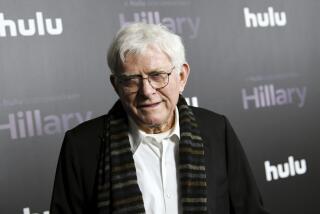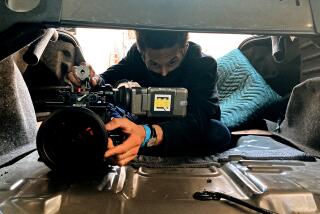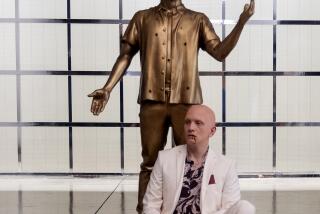Barry Sets Stage for ‘Donahue’ : Television: Mayor Marion Barry will go on the air, but only when his conditions are met--he got 200 tickets for the talk show and the FBI tape wasn’t shown.
- Share via
NEW YORK — When beleaguered Washington Mayor Marion Barry appeared Wednesday before the audience at a live broadcast of the Phil Donahue talk show in Washington, it was probably no accident that Barry got a standing ovation from the crowd. As a condition of his agreeing to be interviewed on the program, Barry had asked for and received 200 tickets for the show.
The program was broadcast from an auditorium at the University of the District of Columbia, which holds about 950 seats. Although views both pro and con on the mayor’s controversial drug trial last summer were presented during the one-hour program, members of the community who support Barry were strongly in evidence, and his remarks were frequently interrupted by applause and cheers.
In addition, as with his interview with Barbara Walters on ABC’s “20/20” last week, Barry also had required that the “Donahue” producers not air the hidden-camera videotape that had been used by government agents in their “sting” operation against him. The videotape showed Barry smoking crack cocaine in a hotel room with a former girlfriend who cooperated with the FBI.
Barry, whose lengthy trial strained race relations in the capital, was sentenced last week to six months in prison and ordered to pay a fine of $5,000 on his one-count misdemeanor conviction for drug possession. He is appealing that decision, and, in an election that will be decided on Tuesday, is campaigning for a seat on the District of Columbia City Council.
“The energy level of Mayor Barry’s supporters may have overwhelmed some of the others, but, in watching the show, you saw the many points of view on the controversy from blacks and whites alike,” said Lillian Smith, who produced the “Donahue” program. “We did not make it a secret to our viewing audience” that Barry supporters were in the auditorium, Smith added.
When Barry arrived onstage to the ovation, host Phil Donahue said, “That’s quite a welcome. It’s quite obvious that not a few of your supporters, people who think you got a raw deal, are here and want you to continue.” “We weren’t trying to keep people from expressing opinions, but we’d like to have an atmosphere where people can see this man as a human being,” said Cora Masters, a private public-relations consultant to Barry who is currently press and communications director for his campaign. “We thought it was important to have the show done in Washington, with an audience from the area. Of the 200 tickets we received, we gave them to public-housing projects, senior-citizen groups and others who might not have the means to pick up tickets for themselves.
“There was no guarantee that these people would all be Barry supporters. In fact, I’d say the show was an accurate reflection of the many viewpoints on this issue--and 90% of the callers were anti-Barry. This is an issue here where either you have a strong opinion, or you don’t know about the case.”
The approximately 700 other seats in the auditorium for the Barry taping, the producers said, were made available on a first-come, first-serve basis.
“Donahue” producer Smith said that this was not the first time that the show had given tickets to supporters on an issue. She said that supporters of the Ku Klux Klan had been in the audience for a “Donahue” program on the Klan, and that Asians had been given tickets for a recent show on race relations.
Both Donahue and Walters noted during their interviews that Barry had made not showing the “sting” videotape a prerequisite for doing the interview.
“We won’t do any program that shows that videotape,” said Masters, noting that Barry objects to the means by which the tape was obtained and to the replaying of the tape on TV news programs--which, she said, has obscured his achievements in the public’s mind.
Not showing the videotape “was one of the conditions of his interview,” said ABC spokeswoman Maurie Perl, “but viewers had seen the footage many times before and, as long as Barbara could ask Barry why he didn’t want it shown, we did not feel that not showing it was a problem.”
More to Read
Get the L.A. Times Politics newsletter
Deeply reported insights into legislation, politics and policy from Sacramento, Washington and beyond. In your inbox twice per week.
You may occasionally receive promotional content from the Los Angeles Times.










